- Home
- Daniel Woodrell
Woe to Live On: A Novel Page 18
Woe to Live On: A Novel Read online
Page 18
“How is Black John?”
Arch shrugged.
“That’s a big question, Dutchy, ’cause the man is dead. Black John is dead. Who ain’t? They got him at Dover and stuck his head on a pole and paraded it down the streets. They put a picture of it in their paper.” He looked me in the eye. “It’s been rough times for us who stuck it out.”
“Aw, the war is lost,” I said.
“No shit, Dutchy. Who does this gal and kid belong to?”
“That’s my wife.”
“Huh. If that don’t beat all. You got a wife and I don‘t.”
A thin trail of mud ran a few feet east of us. I hoped there would be no trouble, and tended to the chicory as I waited.
“Where you headed?” I asked.
“Newport.”
“Hell, man, the militia is in Newport. You can’t go in there.”
“Wrong,” Arch said. “I am goin’ in there.” He seemed way gone in spirit, forlorn and fearless. “I’m for certain sure goin’ in there. I want a drink. They have drinks in Newport. Whiskey. Lager. I want some of both.”
“Arch, they’ll kill you. There’s a couple hundred of them. You need to clear out of this country.”
“I don’t think so, Dutchy. I don’t reckon I’ll clear out of where I was born. I believe I just won’t do it. That there is my hometown. I was raised in there, and I reckon I’ll go on in and have me a drink there, too. Maybe more than one. Maybe a thousand.”
“They’ll kill you sure.”
“Oh, oh,” he said and his lips turned up sickly. “What a horrible fate. Haw, haw, haw. Yes, a horrible fate.”
His whole attitude made me nervous. Sue Lee gave me several shaky glances, and Holt looked down the trail.
“Riders,” Holt said.
“That’ll be the boys,” Arch said. “We all three decided today was the sort of day when we just had to have a drink in Newport.”
Holt and me stood, and I stepped into the timber to see which boys it was. When I saw them clear, I drew a pistol. One was good old Turner Rawls, but the other was Pitt Mackeson.
Both of their bridles flew scalps.
“It’s Mackeson,” I said to Holt.
Holt unlimbered his arms and Arch continued to just sit there, blowing on his chicory.
“Mackeson!” I shouted. I stepped to where he could see me, and when he did he drew.
I shot first and not well. He spurred his horse into the timber on the other side of the trail, and I snuggled behind a stout log on my side. I kept looking for Arch to come up behind me, but he never moved.
Mackeson shot into my general neighborhood and I paid him back in kind. Turner seemed to take no notice of the gunfire and rode on up to me.
“Yake,” he said.
“Get out of the way, Turner.” I prayed that this mangle-mouthed comrade wouldn’t make me kill him. My entire life, such as it had been, narrowed down to this instant.
“Yake, he kill oo.”
“Get out of the way, Turner!”
Off to the side of my vision I saw Arch stand. Holt covered him with a pistol.
“Arch, don’t get in it.”
Arch shook his head, all stolid and mysterious, then walked right past Holt and onto the trail. He mounted his horse.
“Come on, Rawls,” he said. Then he looked to where I lurked. “Dutchy, we’re goin’ on to Newport. Don’t be a fool and keep up at this shootin’ business.”
My wife had been hurled into a mood. She staggered about, with Grace in her hands, crying, and shouting a chorus of premature bereavement, “Oh, no, oh, no, I’m bad, I’m bad, but not this, not this!”
“Go, then,” I said to Arch. “Get.”
“Pitt!” he shouted. “Go on down the trail!”
“Hell, no!” came back the answer in that voice of hideous tone. “I’m killin’ that Dutch son of a bitch!”
“Hey you!” I shouted right back at him. “I’ll kill you for talking rough to me in front of my wife!”
The encounter was a standoff. I couldn’t get at him, nor he at me.
“Look, Dutchy,” Arch said, as he bit the end off a cigar. “Pitt is comin’ with us. You let him alone or there’ll be bad things happen.”
“Get him and go,” I said.
Arch went on down the trail and called to Pitt, promising I wouldn’t fire. After a minute, damned if Mackeson didn’t come clean onto the trail about fifty feet away. He had holstered his pistol and was snorting like he’d heard a whale of a joke. These boys wore death like a garnish; it had no terror for them, and that scared me.
I walked out beside Turner and watched Mackeson close, but I didn’t want to fight anymore. That is what it was, I just didn’t want to fight Americans or Yanks or rebs or niggers or Dutchmen or nothing no more. Then that skunk hooted me, in full view of my woman. My trigger finger itched, but I still didn’t shoot him and I knew I wasn’t the same way I used to was.
Arch and Pitt loped away, not too fast.
“See oo, Yake,” Turner said.
“Aw, no, Turner. Don’t.”
He wouldn’t look at me. I couldn’t get him to do it. His mind was set, and he shook his head and rode slowly away.
“Turner, Turner,” I said. I walked fast beside him. “Damn it, man, come down our way with us.”
All the response I got was him slamming in the spurs and galloping off.
I went to my wife and the baby Grace, and pulled them close to me. I cried with relief from not having been plucked from them. I had things to lose now, and that makes fearlessness a vice.
“Oh, Sue Lee,” I said, and squeezed and squeezed.
Holt packed us up while I lingered in the hug, and when we were calmed it was on down the trail for us, and quick. I didn’t want to hear the shots from Newport.
All that day, and for many days to come, we trotted muddy miles, through a war-sad state and a beautiful country. I knew it to my bones that my world had shifted, as it always shifts, and that a better orbit had taken hold of me.
I had us steered toward a new place to live, and we went for it, this brood of mine and my dark comrade, Holt. This new spot for life might be but a short journey as a winged creature covers it, that is often said, but, oh, Lord, as you know, I had not the wings, and it is a hot, hard ride by road.
ABOUT THE AUTHOR
DANIEL WOODRELL was born in the Missouri Ozarks, left school and enlisted in the marines at seventeen, received his bachelor’s degree at twenty-seven, graduated from the Iowa Writers’ Workshop, and spent a year on a Michener Fellowship. He is the author of nine works of fiction, including the novel Winter’s Bone, the film adaptation of which won the Grand Jury Prize for best picture at the 2010 Sundance Film Festival and received five Academy Award nominations. The Death of Sweet Mister received the 2011 Clifton Fadiman Medal from the Center for Fiction, an award created “to honor a book that deserves renewed recognition and a wider readership.” Woe to Live On was adapted into the Ang Lee film Ride with the Devil. His first collection of stories, The Outlaw Album, was published in 2011. Woodrell lives in the Ozarks near the Arkansas line with his wife, Katie Estill.
Reading Group Guide
WOE TO LIVE ON
A novel by
Daniel Woodrell
A CONVERSATION WITH THE AUTHOR OF WOE TO LIVE ON
Daniel Woodrell talks with Matt Baker of The Oxford American
SIX HOURS INTO my drive I hit the Missouri Ozarks and Doyle Redmond’s (narrator of Woodrell’s novel Give Us a Kiss) description of the landscape flares up in my mind: “Our region, the Ozarks, was all carved by water. When the ice age shifted, the world was nothing but a flood. The runoff through the ages since had slashed valleys and ravines and dark hollows through the mountains…. These mountains are among the oldest on the planet, worn down now to nubby, stubborn knobs. Ozark mountains seem to hunker instead of tower, and they are plenty rugged but without much of the majestic left in them.”
Daniel warned me that his hou
se would be difficult to find, but I brushed off this warning, feeling confident that my car’s navigation system would deliver me to his front door. But about a mile from his house my friendly navigation voice informed me that “turn-by-turn navigation” was no longer possible. I cursed and immediately pulled over because I realized I had no idea where I was or where I was going. I had a general map of the area but I couldn’t pinpoint how to get to his house. I called my wife back in Chicago, and she pulled up a map on her computer and guided me, via phone, to his door.
He was outside, waving me down when I pulled up the small hill. I don’t know if it was because I’d arrived ten minutes later than I said I would or if he knew that my directional confidence would be tested, but he seemed to realize that he needed to be out front, that I would probably drive by a dozen times if he wasn’t. I was in the Ozarks, a little-known place that outsiders quickly stereotype and conveniently lob into the comedic punch lines, but a place, after all, that only natives can truly navigate.
This area (West Plains, Missouri) reminds me a little bit of Fayetteville, Arkansas.
Yes, especially this part of town where I live. We used to live in Arkansas—in Fayetteville, Eureka Springs, and in Jonesboro, for two semesters.
When you lived in Fayetteville did you run around with the University of Arkansas faculty and writers and such—Donald “Skip” Hays, Donald Harington, and others?
Yes, and speaking of Donald Harington, sometimes you get reviewed by someone who understands you so well that it really creeps you out. He was the first person to use the word “expressionism” to describe what I was doing. He was in his hospital bed when he wrote about Winter’s Bone. His wife sent it to me, a copy of his handwritten review. He went out of his way for someone he could’ve regarded as a threat. Some people choose to see other writers from similar parts of the world as a problem and some of them don’t. He was able to so thoroughly grasp what I was doing and even articulate it to me a little bit. I hadn’t spoken to Donald in at least a decade. I knew Skip, and Dale Ray Phillips was around. And what I liked about Fayetteville is you could go down to Rogers Rec any afternoon and find at least one or two other writers hanging around, sometimes seven, eight, or ten of us. Skip would be there sometimes and he’d fill the table top with empty bottles, I do remember that.
I’ve heard that early in your career, agents and publishers were trying to direct you toward a strict genre style.
They were trying to. My first agent really felt that was the path for me. If you’re writing, and not excited by it and getting some kind of interior pleasure out of it—that’s difficult to explain to people who haven’t experienced it—you really shouldn’t do it. In terms of a moneymaking profession, you can find faster ways of making money.
Then you gravitated to writing about the great and mysterious Ozarks.
This region is just not really well defined in most people’s minds. People don’t understand that you can go out in the woods and run into some stained-glass artist from Long Beach. Eureka Springs has got two or three classical artists who have chosen to live there for one reason or another. I mean, you don’t know what you’ll run into out here.
(Katie Estill, Daniel’s wife, walks into the room, and Daniel introduces us.)
You guys have been married how long?
Katie Estill: Awhile.
Daniel Woodrell: We’ve been married, uh….
KE: [Leaving the room.] Tell him in dog years.
DW: It’ll be officially twenty-seven years in about a week. Been together thirty. We met pretty quickly at Iowa and followed each other. There seems to be a sense that you shouldn’t hook up with another writer, but I think you have to have that talk at the beginning of the relationship: If you win, it’s a victory for us; if I win, it’s a victory for us.
You mentioned earlier that you think that the Ozarks are difficult to define. Why do you think that is?
One of the big problems for Ozark writers is the state line that separates it into Arkansas Ozarks and Missouri Ozarks. If we were all in one state I actually do think that would make some difference. And there might be one college or another—as in the case of the University of Mississippi, which is basically devoted to keeping Mississippi writers near the public and presented to the public, and their virtues are extolled by various symposia and whatnot. And, too, Faulkner being from Mississippi, having an impressive town square that stayed alive and vibrant, and Square Books showed up, and The Oxford American was out of there a long time, and Willie Morris and all of these people who have been there one time or another.
And you think of Harington as representing the Arkansas version of the Ozarks.
I mention him all of the time. I’m just astonished how few people know who I’m talking about. And I don’t know why that is. He’s got the work.
You dropped out of high school, went into the marines, and then came back to Kansas City. Then what?
Yes, went back to KC and was only there a couple of months and went to Fort Hays State in Hays, Kansas, on the GI Bill, in-state tuition—
Much like Doyle Redmond in your book Give Us a Kiss.
Exactly. They had rodeos and all of that stuff. I’d never been in the cowboy world. Big ranches, and really big wheat operations, and big cattle operations, too. I’d never really lived anyplace like it—that flat—and I hated it at first, and then after six months I said, It’s gorgeous out here. It just took me six months to realize it. I liked it very much, actually. I thought the people were great, very libertarian about everything. They didn’t necessarily agree with my hippie ways, but they really just observed how you composed yourself and judged you on that.
In your novels I always sense a true respect for the readers, like you know they’re right there, looking over your shoulder.
I’m always very well aware of the fact that I’m telling a story and I’m intending to keep you with me. The first time I ever had a story up at the Iowa workshop this girl says, “Don’t you think it’s sorta cheap to have an opening sentence that makes the reader want to keep reading?” That was my first class at Iowa and I’m thinking, Oh, shit, what have I wandered into here? I often think about bards, and I mention bards all of the time, because, by god, they had to tell a story that kept every class of person interested. There are probably a lot of dead bards, too, who wandered, went into lengthy labyrinthine digressions.
Yeah, they didn’t make it.
Even Faulkner, at his most esoteric, is actually pushing the narrative. He is not languid. Sometimes he makes you confused, but he’s not just lolling around, sniffing the lotus blossoms.
I don’t think you get enough credit for your sense of humor. A book like Give Us a Kiss made me laugh out loud. And even The Death of Sweet Mister, a very dark book, is filled with wonderful humor.
I’m glad you say that because I think most of them have some of it in there. There are many people who say they don’t see any of the humor. And some of the short stories that I’ve done are very macabre and dark. I remember Pinckney Benedict saying to me, after reading one of my short stories, “I don’t know what you think of this, but I thought it was really funny.” Hell yes, it was funny.
I’m sure you get bombarded with questions about the Ozarks from people who’ve never been to this part of the country. Do their questions ever come across as being extremely naive or silly?
They all want to know if the Ozarks I write about in my novels is what it’s really like. No one has ever said that it’s all like that. I mean, is everyone in New York a member of the gang in GoodFellas? I don’t think so. People just want to believe that you’re showing a total depiction, and also, it’s almost like the idea of fiction is getting devalued. Everyone wants to know what’s the truth of it. I’m getting a little bored with that question, because I never said I was anything other than a creative writer.
You incorporate many popular crime fiction themes into your novels and as a result you’re considered a writer of crime fiction as opposed
to a literary writer.
What we call crime fiction now, whether it’s Lehane, Pelecanos, or Laura Lippman, essentially is social realist novels. And I completely agree with that. When I came out of Iowa, I knew that I never wanted to stand in front of a group of academics again and see if they wanted to hire me. I’m never going to do that again. So I would like to have one novel that had something you could take to the public. You don’t need those colleges or academics to say you’re groovy. You can just run right around them and take it to an actual reading public. So I knew I wanted elements of popular fiction in there to give me a chance to survive and develop.
Other than Winter’s Bone, which novel do people most often cite as their favorite?
Tomato Red. It got some nice reviews but actually got far more nasty reviews than all of my other books combined. And most of them were from the South, which I couldn’t figure out. I thought, Is it the gay kid or what? I don’t know what it was.
Really? What did the negative reviews say? Why were they negative?
Oh, a variety of reasons. Some were mildly dismissive. Some were really ugly—one actually, I felt, went way beyond literary reviewing, and I asked my wife, “I didn’t get drunk and fuck his girlfriend did I?” She said, “I don’t think you did.”
The Death of Sweet Mister is my favorite. I still remember the chilling sensation I experienced reading the final line of that book, “I’d say no dawns ever did break right over her and me again.”
I actually felt like that book broke through in another direction. That was a case where once I got in the tune of it, nothing was in the way. And frankly, if I get in tune like that, if I’m not pulled out of it, I pretty much shuffle around in a robe staying in there. And I don’t come out. That one was that way, and Woe to Live On was that way, too. I don’t know what it is. I’m just running hard to keep up with it.

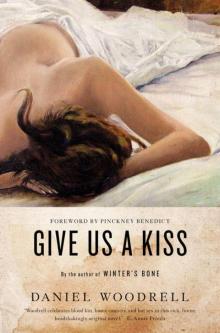 Give Us a Kiss: A Novel
Give Us a Kiss: A Novel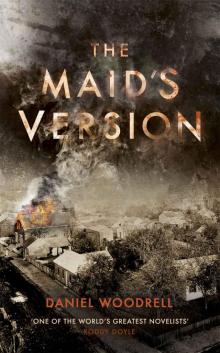 The Maid's Version
The Maid's Version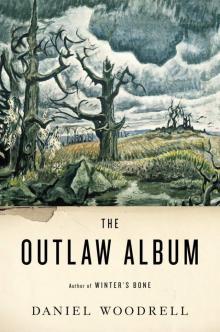 The Outlaw Album: Stories
The Outlaw Album: Stories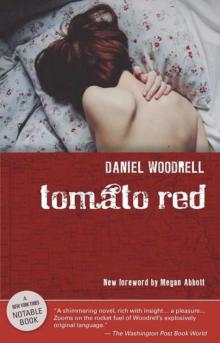 Tomato Red
Tomato Red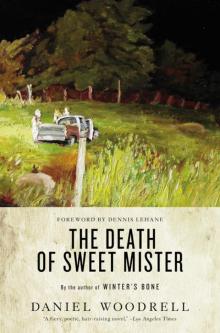 The Death of Sweet Mister
The Death of Sweet Mister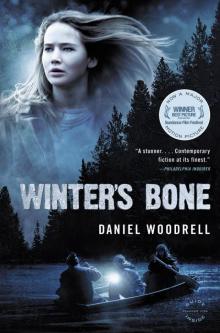 Winter's Bone
Winter's Bone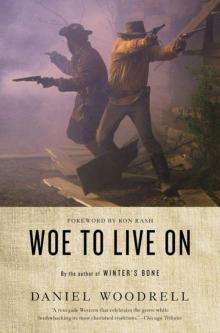 Woe to Live On: A Novel
Woe to Live On: A Novel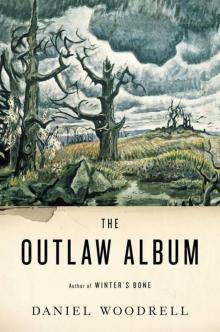 The Outlaw Album
The Outlaw Album